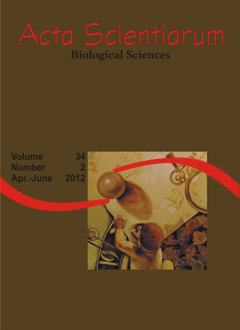<b><i>Austrodiplostomum compactum</i> (Lutz, 1928) (Digenea, Diplostomidae) in the eyes of fishes from Paraná river, Brazil</b> - doi: 10.4025/actascibiolsci.v34i2.9337
Abstract
Parasitological indexes of Austrodiplostomum compactum (Digenea, Diplostomidae) in fishes from the Paraná River, Presidente Epitácio region, state of São Paulo, Brazil, and their relationship with climate and water quality are evaluated. Fifty-one specimens of Plagioscion squamosissimus, 39 Geophagus surinamensis, 27 Hoplias malabaricus and 23 Cichla sp. were collected between June 2007 and June 2008. Water quality and rainfall indexes were measured monthly. P. squamosissimus had the highest parasite rate, with 98% total prevalence, intensity of infection varying between 1 and 255 and parasite mean abundance totaling 40.5 ± 9.9. H. malabaricus had the next parasite rate, with 66.6% total prevalence, parasite intensity between 2 and 184 and mean abundance totaling 22.4 ± 20.9. Cichla sp. had a total prevalence of 52.1%, intensity between 1 and 21, and mean abundance 4.3 ± 2.9. Finally, G. surinamensis had a total prevalence of 46.1%, intensity between 1 and 53 and mean abundance 7.1 ± 8.8. A survey of diplostomid infection in Brazil and the role of piscivore fish as an important host have also been discussed.
Downloads
DECLARATION OF ORIGINALITY AND COPYRIGHTS
I Declare that current article is original and has not been submitted for publication, in part or in whole, to any other national or international journal.
The copyrights belong exclusively to the authors. Published content is licensed under Creative Commons Attribution 4.0 (CC BY 4.0) guidelines, which allows sharing (copy and distribution of the material in any medium or format) and adaptation (remix, transform, and build upon the material) for any purpose, even commercially, under the terms of attribution.
Read this link for further information on how to use CC BY 4.0 properly.












1.png)




3.png)













